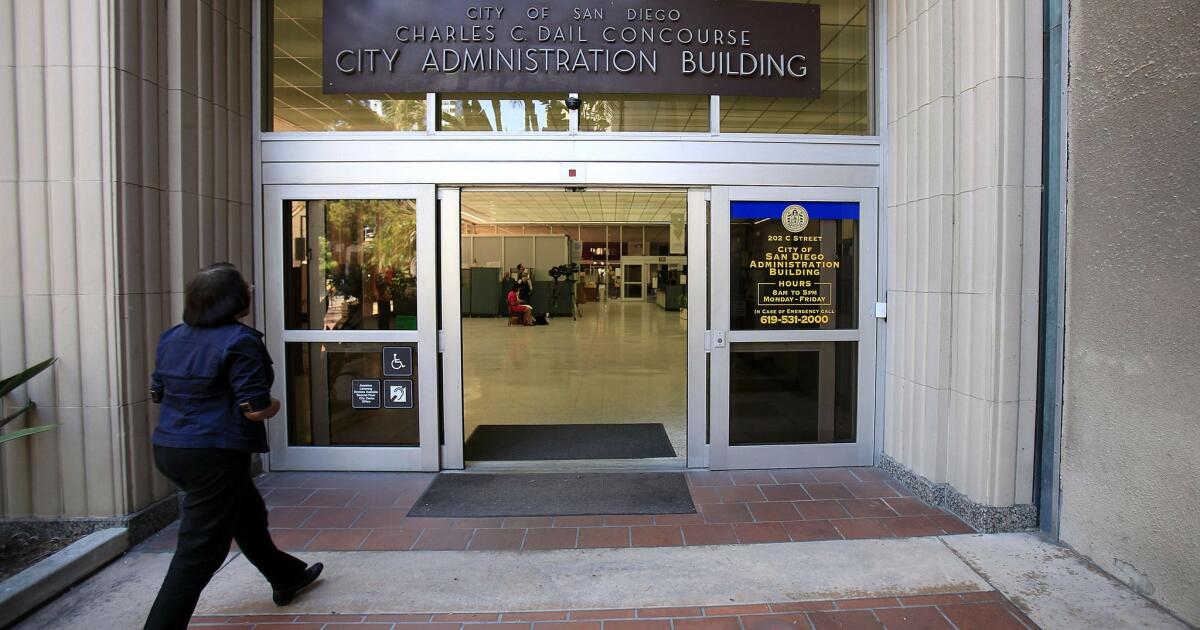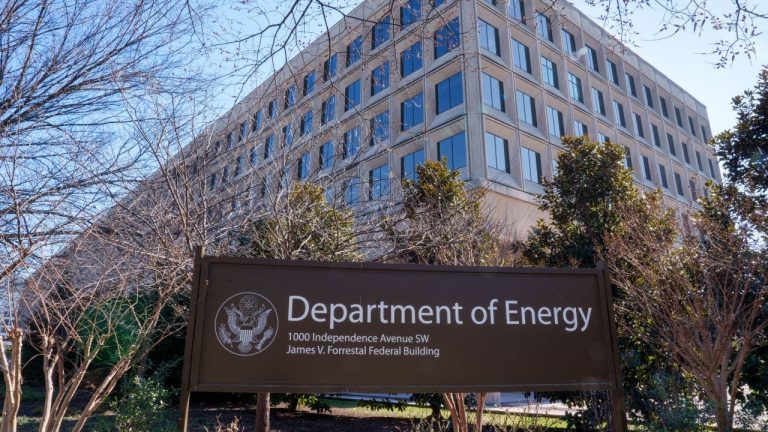

San Diego’s pension board voted Friday to reject a proposed $352 million reduction in the city’s pension payments over the next four years, calling the proposal a threat to the city’s long-term financial stability.
In a 10-3 vote, the pension board opted instead for a more conservative proposal that reduces the city’s payments $103 million over the next four years and keeps payments more steady a decade from now.
The more aggressive proposal would have dramatically lowered payments in the near term and required sharply escalating payments after that, particularly from 2035 to 2039.
Critics said the move would have been similar to the pension underfunding two decades ago that earned San Diego the nickname “Enron-by-the-Sea.”
City finance officials lobbied hard Friday for the more aggressive proposal, contending it was crucial to helping them close a $221 million budget deficit projected for the coming fiscal year.
They said the proposed payment schedule made sense because city revenue would increase sharply in coming years, especially if voters approve some tax increases city officials are considering for the November ballot.
Several board members questioned whether city revenue would rise enough in coming years to make it feasible to cover the escalated payments, contending at least one economic downturn is likely by then.
“You are not a good credit risk,” board member Roberta Spoon told city officials after they showed her dozens of tables with large projected budget deficits.
Board members, who had tentatively endorsed the more aggressive approach to lowering payments at a meeting in January, appeared to be swayed Friday by the pension system’s chief executive and fiduciary, who both raised serious concerns.
“I think it’s important to mitigate risk as much as possible,” Chief Executive Greg Rademacher told the board. “We know that good things are going to happen and bad things are going to happen, so I get worried.”
Rademacher stressed that the more conservative payment schedule the board ultimately adopted created less volatility in financial models created by the pension system’s actuary.
Ashley Dunning, the pension system’s fiduciary, raised concerns that the board might choose the more aggressive approach primarily because of pressure from the city.
She said it would violate the board’s fiduciary responsibilities to pension system retirees if it allowed a proposal created at the behest of the city to jeopardize the system’s long-term stability.
“It is not preferred, from a fiduciary perspective, to have this type of interaction of this magnitude,” she said, referring to city officials lobbying for the more aggressive reduction in near-term payments.
Dunning also said there didn’t appear to be sufficient motivation, other than helping the city, to choose the more aggressive proposal over the more conservative approach the board ended up approving.
She said making such a big move without appropriate motivation could make the pension system vulnerable to litigation.
“My recommendation is that you make sure any decision you make is done for the right reason, and that reason cannot be to save the city money,” she said.
She said the more conservative approach the board adopted was more defensible because it brings the pension system in line with nationwide best practices.
The $103 million in savings comes from shifting how the pension system’s long-term debt is calculated by basing it on percentages of employee salaries instead of actual salaries.
The city switched to using actual salaries a decade ago after voters approved Proposition B, which eliminated pensions for most new hires. It is standard for pension systems to use actual salaries for debt calculations when there won’t be any new members.
But the courts overturned Proposition B, forcing the city to create retroactive pensions for more than 5,000 workers. It is standard for pension systems still getting new members to use percentages of employee salaries for debt calculations.
Adoption of the more conservative proposal puts the city in a more dire budget predicament than if the more aggressive approach had been approved.
Instead of $100 million in relief for the coming fiscal year, the proposal adopted Friday will provide $37 million to the city.
But only 73 percent of that relief, or $27 million, will go to the general fund, because only 73 percent of city salaries are in the general fund. The other 27 percent of salaries are covered by enterprise funds, primarily the city’s sewer and water divisions.
The proposal adopted Friday lowers the city’s pension payment for the coming fiscal year from $526.6 million to $489.6 million. In fiscal year 2026, the payment is scheduled to be $499.4 million — $29.6 million less than it was under the old plan.
The new plan delays the payoff of the system’s $3.4 billion in pension debt from 2040 to 2042. And by delaying higher payments, it increases the overall cost of paying off that debt by $406 million.
Two of the three board members who voted against the new plan said they preferred the proposal to lower payments more aggressively. They said that plan would help the city avoid or reduce layoffs this spring.
“It’s not just prudent, it is the most prudent,” board member Bret Bartolotta said of the more aggressive plan.
Natasha Collura said it was crucial for the pension board to help the city be able to cover its annual pension payment without having to lay off workers or reduce services taxpayers expect and need.
But others disagreed.
“I’m especially concerned about the risks,” said board member Clifford Schireson. “It isn’t only where we’re going to end up 30 years from now, it’s the path over the next five to 10 years that is of greatest concern.”
Board member Louis Maggi said the city’s proposal was irresponsible.
“If a family member came to me saying they are having a credit card debt problem, it would be like me telling them, ‘You know what, pay less for a few years and maybe down the road you’ll make more money and the payment will be less painful,’” Maggi said.
Several members of the public also spoke against the more aggressive proposal.
“Giving the city funding relief is not appropriate and would not even be before you had the city not requested it,” said Ron Saathoff, who was a member of the pension board for 20 years, including the Enron-by-the-Sea scandal.
Former City Attorney Mike Aguirre threatened to file suit if the board approved the more aggressive proposal. Aguirre said he was filing public records requests for any recent communication between board members and city officials.
The San Diego County Taxpayers Association, which had strongly supported Proposition B, said city leaders must demonstrate more effective fiscal management before getting any sort of pension reprieve.






